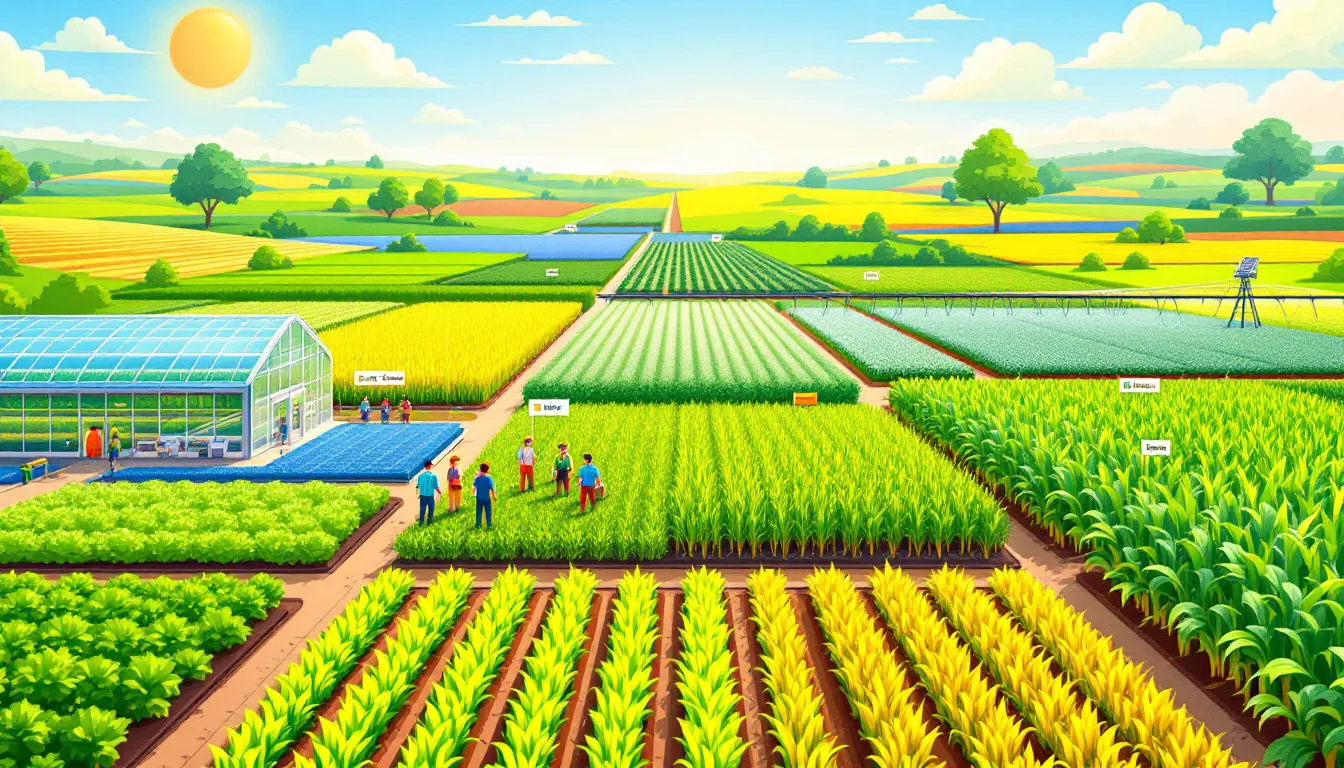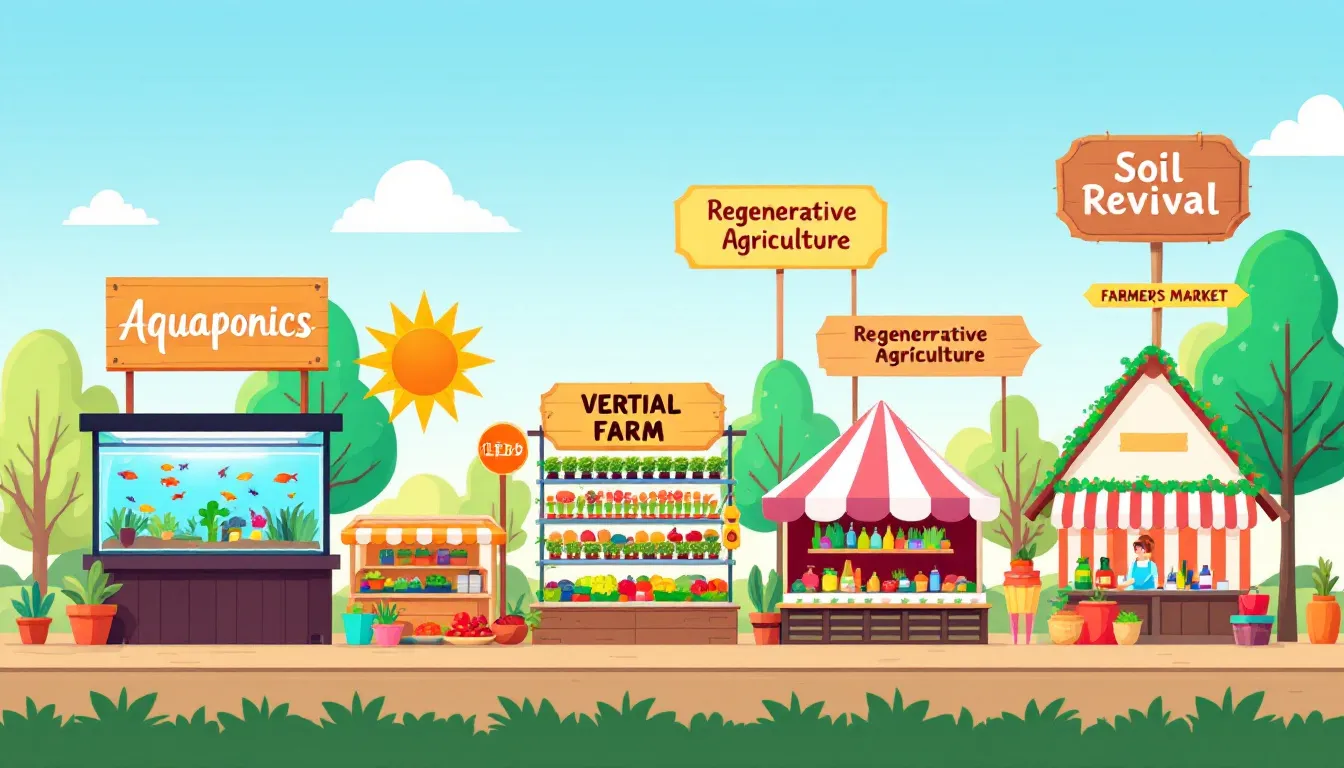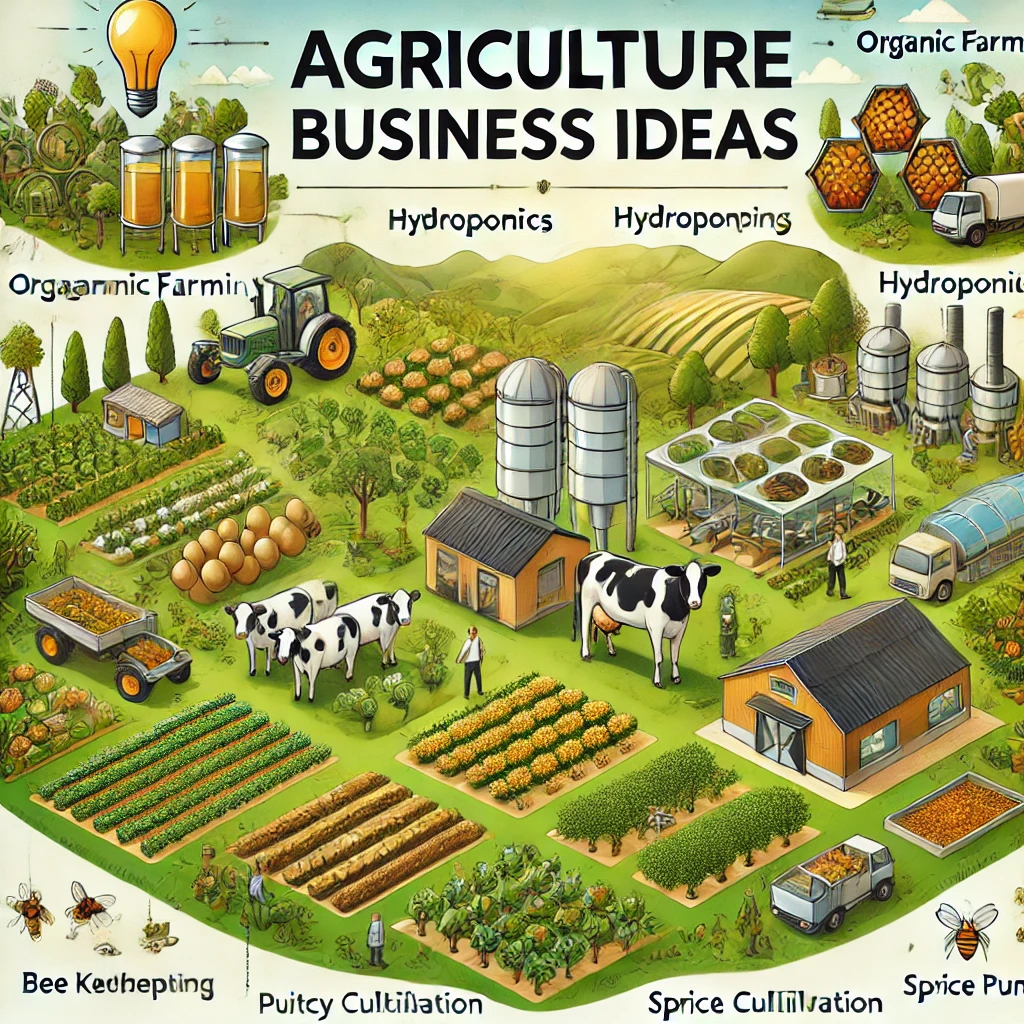Searching for an agricultural business idea that can ensure steady profits? This article covers 15 diverse agriculture business ideas, ranging from traditional farming to cutting-edge agri-tech solutions. These ideas cater to different investment levels and expertise, helping you find the perfect fit for your goals.
Key Takeaways
- Agriculture plays a vital role in the global economy, contributing approximately 18% to India’s GDP and providing livelihoods for around 58% of its population.
- There are numerous lucrative opportunities in agriculture such as organic farming, vertical farming, and agri-tourism, driven by rising consumer demand for sustainable and locally produced food. Exploring various farming business ideas, including innovative and sustainable practices like manure businesses, can provide profitable ventures for both established farmers and newcomers.
- Successful agricultural ventures rely on factors like market accessibility, technology adoption, government support, and effective risk management to navigate challenges and optimize profitability.
Introduction to Agriculture Business
Agriculture business refers to the production, processing, and distribution of agricultural products. It is a vital sector that provides food, raw materials, employment, and income to millions of people around the world. The agriculture industry is constantly evolving, driven by technological advancements, changing consumer preferences, and environmental concerns. As a result, there are numerous opportunities for entrepreneurs to start a successful agricultural business.
The agriculture business encompasses a wide range of activities, from traditional farming practices to modern agri-tech solutions. Entrepreneurs can explore various profitable agriculture business ideas, such as organic farming, vertical farming, and livestock farming, to name a few. With the right knowledge, resources, and strategies, starting an agricultural business can be a rewarding and impactful venture.
What is an Agriculture Business?
An agriculture business is a business that engages in the production, processing, or marketing of agricultural products. This can include businesses that grow crops, raise livestock, or produce food and beverages. Agricultural businesses can be found in all parts of the world and play an important role in the global economy.
Agricultural businesses vary in size and scope, from small family farms to large agribusiness corporations. They contribute significantly to the economy by providing essential goods, creating jobs, and supporting rural development. With the growing demand for sustainable and locally produced food, there are many agricultural business ideas that entrepreneurs can explore to build a successful and profitable venture.
Why Agriculture is a Vital Industry

Economic Foundation: Agriculture is a cornerstone of the global economy, providing essential food, raw materials, and employment to millions. It contributes approximately 18% to India’s GDP and supports around 58% of the population, underscoring its significance in economic development.
Historical Significance: As one of the oldest professions, agriculture traces its roots back to the dawn of human civilization. Its enduring presence highlights its fundamental role in sustaining societies through the ages.
Employment Provider: Agriculture is a major source of livelihood for a large portion of the population, particularly in developing countries. It plays a crucial role in reducing poverty and enhancing rural development.
Challenges and Risks: The sector faces numerous challenges, including climate change, population growth, land degradation, water scarcity, and market fluctuations. These uncertainties can disrupt income stability, but innovative solutions can mitigate these risks.
Growth Opportunities: The global agriculture market is projected to grow substantially. For instance, India’s agriculture market is expected to reach USD 473.72 billion by 2029, creating numerous opportunities for entrepreneurs.
Food Security: Agriculture is vital for ensuring food security, providing the necessary resources to feed a growing global population. It remains indispensable for maintaining economic stability and health.
Innovation Potential: Despite challenges, the agriculture sector offers immense potential for growth and innovation. New technologies and sustainable practices are driving significant advancements, making it an attractive field for new business ventures.
Reasons to Start an Agriculture-Based Business in India

Economic Contribution: Launching an agriculture-based business can be highly rewarding due to its significant impact on GDP and employment rates, especially in developing countries. Agriculture contributes about 18% to India’s GDP and provides jobs to millions, playing a crucial role in poverty alleviation.
Rising Consumer Demand: The increasing consumer preference for organic and locally produced food creates lucrative opportunities for new ventures. As health consciousness and environmental awareness grow, consumers are willing to pay a premium for organic produce, driving market opportunities for an organic farming business.
Potential for Profitability: Success stories from established brands demonstrate the potential for profitability in the agricultural sector. With a young workforce, robust infrastructure, and an evolving agri-tech ecosystem, new agricultural businesses can thrive, especially in regions like India with diverse climates and vast land resources.
Agri-Tourism Opportunities: Agri-tourism provides an innovative way to boost farmer income by inviting visitors to experience farm life and participate in agricultural activities. This creates additional revenue streams through educational farm tours and recreational experiences, offering a unique blend of tourism and agriculture.
Sustainability and Innovation: Agriculture offers immense potential for growth and innovation through sustainable practices and new technologies. Entrepreneurs can contribute to environmental sustainability while exploring profitable agriculture business ideas that align with current market trends.
Government Support: Various government schemes and subsidies provide financial support and incentives for agriculture businesses. These initiatives create a conducive environment for growth and sustainability, making agriculture an attractive field for new business ventures.
Investment and Capital Requirements
Investment and capital requirements are pivotal factors to consider before starting an agriculture business. Investment in agriculture includes not only physical capital, such as land and machinery, but also human capital formation and environmental considerations. Public investment in agriculture often declines, which can hinder private sector investment and limit overall growth in the agricultural sector.
Farmers are typically cautious about committing resources without sure returns, as agricultural investments are often characterized by their irreversibility. Wealthier farmers tend to invest more due to their ability to take on higher risks compared to poorer farmers, who may prioritize stability over potential returns.
Analyzing high-investment versus low-investment agriculture businesses for profitability is necessary to make informed decisions.
Key Factors for Success in Agriculture

- Market Accessibility: Successful agricultural ventures rely heavily on easy access to markets. Ensuring that farmers can efficiently reach their target markets is crucial for selling produce and maintaining profitability.
- Suitable Land Location: The choice of land plays a pivotal role in agricultural success. Access to fertile soil and favorable climatic conditions enhances production capabilities, making it essential to select the right location for farming.
- Technology and Sustainability: Investing in technology and sustainable farming practices is vital. These investments can significantly boost productivity without the need to expand arable land, ensuring efficient resource use.
- Uniform Crop Production: Achieving uniformity in crop production can lead to higher yield outcomes and better marketability. Consistency in quality and quantity is essential for meeting market demands and maximizing profits.
- Proper Planning: Effective planning lays the foundation for successful crop cultivation. It involves assessing land and infrastructure needs, setting realistic goals, and devising strategies to optimize resources.
- Diverse Climate and Soil Types: Leveraging the diverse climate and soil types can significantly impact the success of agriculture businesses. Understanding the specific needs of different crops helps in selecting the best-suited farming practices.
- Resource Availability: Natural resource availability, such as water and nutrients, creates a conducive environment for successful agricultural practices. Efficient management of these resources is critical for sustained agricultural productivity.
Government Support for Agribusinesses

- Financial Assistance: Government schemes such as the Pradhan Mantri Kisan Samman Nidhi (PM-KISAN) provide direct financial support to farmers, helping them manage expenses and invest in agricultural activities.
- Pension Schemes: The Pradhan Mantri Kisan Maan-Dhan Yojana (PM-KMY) offers a monthly pension to farmers after they reach 60 years of age, ensuring financial security in their later years.
- Crop Insurance: The Pradhan Mantri Fasal Bima Yojana (PMFBY) provides comprehensive crop insurance, covering various non-preventable risks, thereby mitigating financial losses due to unforeseen events.
- Infrastructure Development: The Agriculture Infrastructure Fund (AIF) is a financing facility focused on enhancing agricultural infrastructure, supported by significant government allocation to improve storage, processing, and distribution capabilities.
- Loan Schemes: Agricultural loan programs, including NABARD and Mudra Loan, offer funding opportunities to agribusinesses, reducing the financial burden on farmers and encouraging investment in the agriculture sector.
- Policy and Investment Support: Government policies and infrastructure investments are pivotal in facilitating agricultural productivity and investment, creating a conducive environment for growth and sustainability in agribusinesses.
Market Demand and Profitability Analysis
- Understanding Market Demand: Essential for starting an agriculture business; involves identifying target markets and customer preferences to gauge potential demand.
- Break-Even Analysis: Determines the number of units needed to be sold to cover total costs, crucial for financial planning.
- Estimating Production Costs: Involves calculating both fixed and variable costs to ensure accurate financial projections.
- Pilot Projects: Useful for validating market demand and refining strategies based on real feedback.
- Profitability Evaluation: Involves projecting sales and revenue, then subtracting total production costs to gain financial insights.
- Market Research and Analysis: Ensures alignment with consumer needs and trends, aiding in strategic planning.
- Export Opportunities: Exporting agricultural produce can open new markets and enhance demand.
- Online Agri-Marketplaces: Provide additional avenues for evaluating demand and potential profitability, facilitating broader market access for farmers.
Top Agriculture Business Ideas

Agriculture offers diverse business opportunities across various sectors, enabling entrepreneurs to leverage the growing market demand. From traditional farming practices to innovative solutions, the following subsections will explore some of the top farming business ideas that can provide significant profitability and sustainability.
Organic Farming
Organic farming is becoming popular due to increasing consumer health consciousness and environmental awareness. Demand for organic produce is surging, with consumers willing to pay a premium for organic fruits, vegetables, herbs, and livestock products. An organic farming business is considered a highly profitable agribusiness, with the right certification and understanding of market dynamics.
Profitable products in organic farming include organic fruits, vegetables, herbs, and organic meat and dairy from livestock farming. Entrepreneurs can tap into this lucrative market by adopting sustainable farming practices and obtaining the necessary certifications to market their organic produce effectively.
Vertical Farming
Vertical farming grows plants in layers or on vertically tilted surfaces, commonly practiced in cities or areas with limited land. This method maximizes limited space, optimizes crop production, and allows for year-round production, advantageous in urban areas.
Crops suitable for vertical farming include greens, herbs, and microgreens. Key components needed for vertical farming typically include vertical towers, hydroponics, and LED lights. This farming method offers a sustainable alternative to traditional farming practices, providing fresh and local produce to urban consumers.
Hydroponic Farming
Hydroponic farming uses nutrient-rich water to grow plants without soil. This method offers advantages like faster crop growth, less water usage, year-round production, and high scalability. The production process is fast and efficient, allowing for high-quality crops to be grown in limited space.
Lettuce, tomatoes, and strawberries are well-suited for hydroponic farming. These crops thrive in such systems. With the growing demand for fresh, sustainably cultivated produce, hydroponic farming presents a profitable agricultural industry.
Livestock Farming
Livestock farming includes profitable businesses like poultry farming, dairy farming, and goat farming. Poultry farming for eggs and meat is common, characterized by high year-round demand and good market value. Dairy farming, including cow and buffalo milk production, is a popular business idea providing steady income.
Goat farming can be a sustainable business, offering an alternative source of income for many farmers. This form of livestock farming is known for its resilience and adaptability to different environmental conditions, making it a viable option for diverse geographical areas.
Poultry Farming
Poultry farming is one of the most popular and profitable agriculture business ideas. It involves the raising of chickens, ducks, turkeys, and other birds for their meat and eggs. Poultry products are in high demand throughout the year and have a good market value. With the increasing demand for protein-rich food, poultry farming is becoming a lucrative business opportunity for entrepreneurs.
Poultry farming can be categorized into two main types: broiler farming and layer farming. Broiler farming focuses on raising chickens for meat production, while layer farming is dedicated to egg production. Both types of poultry farming offer significant profit potential, provided that proper farm management strategies are implemented.
Starting a poultry farm requires careful planning, including selecting the right breed, setting up appropriate housing, and ensuring proper nutrition and healthcare for the birds. With the right approach, poultry farming can be a highly profitable agricultural business, catering to the rising demand for poultry products in the market.
Beekeeping and Honey Production
Beekeeping involves keeping bees to harvest products like honey, wax, and pollen. Demand for natural honey and honey-based products is high, driven by consumer preferences for natural and organic items. Honey production is a profitable agriculture business idea that also supports pollinators.
Beekeeping generates revenue from honey sales, beeswax products, and pollination services. Starting beekeeping requires a few hives and essential equipment like frames, smokers, and gloves.
Honey products can be marketed directly to consumers. They can also be sold through local markets, health stores, and online platforms.
Medicinal Herb Cultivation
Medicinal herb cultivation offers promising business opportunities in crafting and marketing medicinal herbs and products.
For centuries, medicinal herbs have been utilized for their healing benefits. Their therapeutic properties are well-known and have been valued over time.
Some highly demanded herbs include:
- Lavender
- Rosemary
- Mint
- Basil
These herbs are popular among consumers.
Herb farming requires suitable climate conditions and minimal space, making it accessible and lucrative for small farmers. A variety of herbal products can be derived from the cultivation of medicinal herbs, adding to the business’s profitability.
Mushroom Farming
Mushroom farming is profitable, driven by increasing demand for mushrooms in culinary applications. Types of mushrooms that can be cultivated include button, oyster, and shiitake. Requiring low investment, mushroom farming is accessible for new entrepreneurs.
Mushroom farming offers high profit potential despite low investment. Mushrooms can be grown using organic waste materials like straw, sawdust, and coffee grounds. This approach contributes to sustainable farming practices. Basements or sheds are suitable spaces for cultivation, offering flexibility for farmers.
Innovative Agriculture Business Ideas
Innovation in agriculture addresses modern challenges and maximizes productivity. Agriculture offers diverse business models like agri-tech solutions, aquaponics, and precision agriculture, promising to revolutionize traditional farming.
The following subsections will explore these innovative ideas.
Agri-Tech Solutions
Agri-tech solutions encompass a range of technologies designed to increase productivity, optimize resources, and promote sustainability in agriculture. Farm management software and automated irrigation systems are examples of technology in agriculture. Drones for crop monitoring and AI-driven analytics are also included in this category. These digital farming solutions, including IoT and AI-based agri-tech, are transforming agriculture by providing real-time data and insights.
These technologies aid farmers in making informed decisions, enhancing crop management, and reducing resource wastage. Adopting agri-tech solutions significantly improves the efficiency and profitability of agricultural operations, making them essential in modern farming.
Aquaponics
Aquaponics is a sustainable farming technique. It integrates fish farming with hydroponics. This innovative system relies on a symbiotic relationship between fish and plants, where fish waste provides nutrients for the plants, and the plants help to filter and clean the water for the fish. One of the primary benefits of aquaponics is the year-round production of plants and fish, making it a highly sustainable farming practice.
Aquaponics enables the cultivation of both fish and plants in a mutually beneficial system, enhancing sustainability and efficiency. Ideal for urban areas and regions with limited land, this method provides fresh and local produce to consumers.
Precision Agriculture
Precision agriculture uses advanced technologies to enhance crop management. Technologies like sensors and drones monitor crop conditions and field variability. Data analytics in precision agriculture helps farmers make more informed decisions based on real-time insights regarding crop health and soil conditions.
By using geographic information systems (GIS) to analyze and manage field variability, precision farming allows for the optimization of resources and increased productivity. This innovative approach to farming is essential for sustainable agriculture practices and maximizing crop yields.
Supporting Services in Agriculture
Supporting services enhance productivity and sustainability in farming practices. These services, including agricultural consulting, custom farming, and cold storage, play a critical role in the agricultural supply chain.
Agricultural Consulting
Agricultural consultants offer services like soil analysis and crop selection. They also help in creating sustainable farm management strategies. They play a critical role in supporting new agriculture businesses by enhancing their operational efficiency and sustainability. Farm management software can significantly streamline operations for farmers, making it easier to monitor production and manage resources.
Offering expert guidance on farm management strategies, an agricultural consulting firm helps farmers optimize crop management and improve productivity. This support is crucial for the success of both new and established agricultural businesses.
Custom Farming Services
Custom farming services offer tailored solutions, giving farmers access to necessary equipment and expertise. Examples of custom farming services include tractor and harvester rentals, which facilitate farming operations without the need for ownership. By utilizing custom farming services, farmers can significantly reduce operational costs associated with equipment maintenance and investment.
These services present a viable option for farmers looking to enhance productivity while managing expenditures effectively. Custom farming services support sustainable farming practices by providing access to advanced equipment and technologies.
Cold Storage and Warehousing
Cold storage and warehousing maintain the quality and safety of perishable products. Efficient warehousing prevents food loss and enhances food security by addressing storage issues. Cold storage technology provides farmers with better price control, allowing them to sell products when demand is higher.
Cold storage systems reduce waste and spoilage in the agricultural supply chain. Key considerations when starting an agricultural warehousing firm include location, infrastructure, equipment, and market needs.
These facilities enhance market access for farmers by ensuring products remain fresh longer.
Online Agriculture Business Ideas
The internet has opened up new opportunities for agricultural businesses to reach a wider audience and increase their sales. Here are some online agriculture business ideas that can be profitable:
Agro-Blogging
Agro-blogging is a relatively new but increasingly influential business idea in the agriculture sector. It involves creating a blog or website that provides valuable information on agriculture, farming, and related topics. Agro-blogging can be a profitable business, especially for those with expertise in agriculture and writing. By creating high-quality content and building a large following, agro-bloggers can attract advertisers, sponsors, and affiliate marketers, generating revenue through advertising, sponsorships, and affiliate marketing.
Agro-blogging can also be used to promote agricultural products, services, and businesses. By creating a blog or website that showcases agricultural products or services, entrepreneurs can reach a wider audience and increase their sales. Additionally, agro-blogging can be used to provide educational resources and training to farmers, agricultural professionals, and enthusiasts, generating revenue through course sales, consulting, and coaching.
Overall, agro-blogging is a profitable agriculture business idea that can be started with low investment and has the potential to generate high returns. By leveraging the power of the internet, agro-bloggers can make a significant impact in the agriculture sector while building a successful and sustainable business.
Agro-Processing Business Ideas
Agro-processing includes the production, processing, or marketing of agricultural products. This sector enhances the value of raw agricultural products and boosts market competitiveness.
The following subsections explore specific agro-processing business ideas that offer significant profitability.
Food Processing
Food processing is a viable business that includes producing pickles, jams, and juices. Vegetable farmers can boost profitability by processing their produce into value-added products like pickles, sauces, and jams. Using locally and organically sourced ingredients can set products apart. This strategy is crucial in the competitive food processing industry.
Other profitable ventures include making spice powders like turmeric, chili, and coriander, and flour milling for wheat, maize, and rice. Oil extraction units for mustard, groundnut, and coconut offer lucrative opportunities in the agro-processing sector.
Organic Fertilizer Production
Organic fertilizer production supports sustainable farming practices and is a valuable agriculture product manufacturing idea. Vermicompost production effectively recycles organic waste into nutrient-rich fertilizer. This process reduces waste and offers a sustainable alternative to chemical fertilizers.
Bio-pesticide and bio-fertilizer production support sustainable agriculture by offering eco-friendly pest and disease management solutions. Growing market demand for organic fertilizers makes it a profitable business idea.
Challenges and Risk Management in Agriculture
- Production Risks: Agriculture is highly susceptible to unpredictable factors such as weather conditions, pests, and diseases, which can significantly impact crop yields and livestock health.
- Market Risks: Fluctuations in commodity prices can affect the income farmers receive for their products, leading to potential financial instability.
- Financial Risks: Taking on debt exposes farmers to rising interest rates and credit limitations, which can strain their financial resources.
- Institutional Risks: Changes in government policies can alter agricultural practices and affect financial support, creating uncertainties for farmers.
- Human Risks: Personal crises, including health issues or family problems, can disrupt agricultural operations and need to be managed effectively.
- Market Competition: Intense competition and pricing fluctuations pose risks to agriculture businesses, requiring strategic planning and market analysis.
- Pest and Disease Management: Effective management is crucial for the sustainability of agriculture businesses, necessitating ongoing attention and resources.
- Risk Management Strategies: Diversifying crops, using insurance products, and understanding market dynamics are essential strategies for mitigating risks in agriculture.
The Future Potential of Agribusiness
- Promising Growth: Agribusiness is poised for significant growth, with increasing agricultural exports and the adoption of sustainable farming practices.
- Export Success: India’s agricultural exports have surpassed $50 billion, highlighting the sector’s robust growth potential.
- Urban Agriculture: As city populations grow, urban agriculture emerges to meet local food demands, providing fresh and local produce to urban consumers.
- Digital Agriculture: The integration of data collection and analysis in agriculture enhances farming practices and propels future innovations.
- Research and Development: Investments in R&D drive advancements in agricultural technologies and practices.
- Sustainable Demand: There is a growing demand for sustainable and profitable agriculture business ideas, indicating a bright future for agricultural ventures.
- Bright Outlook: The rising demand for innovative agriculture business ideas underscores a promising future for the sector.
Summary
In summary, the agriculture sector offers a wide range of profitable business ideas for today’s entrepreneurs. From traditional farming practices like organic farming and livestock farming to innovative solutions like vertical farming and agri-tech, the opportunities are vast and varied. Understanding market demand, investment requirements, and government support is crucial for success in agribusiness.
The future of agribusiness is promising, with significant potential for growth and innovation. By adopting sustainable farming practices and leveraging new technologies, entrepreneurs can contribute to the economic stability and food security of their communities. Embarking on an agriculture-based business venture can be a rewarding and impactful journey, offering both financial and societal benefits.
Frequently Asked Questions
What are some profitable agriculture business ideas for beginners?
For beginners, starting with organic farming, hydroponic farming, beekeeping, or cultivating medicinal herbs can be highly profitable ventures. These options not only offer growth potential but also align with current market trends towards sustainability and health.
How can I start an agriculture business with limited capital?
You can successfully start an agriculture business with limited capital by focusing on low-investment options such as mushroom farming, beekeeping, or medicinal herb cultivation. Additionally, consider utilizing custom farming services and exploring government loan schemes to manage your initial costs effectively.
What role does technology play in modern agriculture?
Technology is essential in modern agriculture as it enhances productivity, optimizes resource use, and supports sustainability through tools like farm management software, automated irrigation, drones, and AI analytics. Embracing these innovations is vital for the future of farming.
How can I mitigate risks in my agriculture business?
To effectively mitigate risks in your agriculture business, focus on diversifying your crops, utilizing insurance products, and understanding market dynamics, alongside implementing strong pest and disease management strategies. This comprehensive approach will enhance your resilience against potential challenges.
What government support is available for agribusinesses?
Government support for agribusinesses encompasses financial assistance through schemes like PM-KISAN and PMFBY, in addition to agricultural loan programs that offer crop insurance and infrastructure funding. These initiatives are designed to foster growth and sustainability within the agriculture sector.
